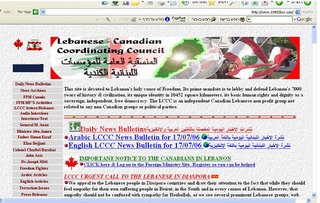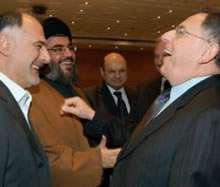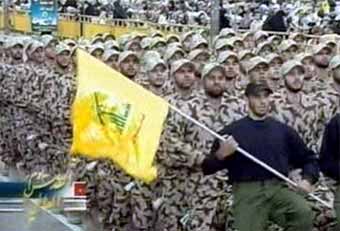 Walid Jumblatt, Leader of the PSP (Photo: Wikipedia)
Walid Jumblatt, Leader of the PSP (Photo: Wikipedia)Like most of the Western media, Ha'aretz has done a very poor job of covering the events that transpired in Lebanon last week. With Hizbullah having imposed a de facto blackout early on in its coup attempt, few people inside or outside the country were in a position to gain a sense of what was happening on the ground. Hizbullah's own media war has added to the confusion, so that it is not at all clear who won, if anyone. Thus, I was more than a little annoyed by the coverage of Zvi Barel, who seems to have bought the line that Hizbullah scored a major victory:
Sad and tired, wearing shabby clothes and with tears in his eyes, Druze leader Walid Jumblatt stood on the veranda of his luxurious home in Beirut's Clemenceau neighborhood and explained his decision to television viewers. A few hours before the interview, he had called his political rival, Talal Arsalan, and asked him to coordinate with Hezbollah leader Sheikh Hassan Nasrallah the cessation of the fighting in Mount Lebanon, Aley, Chouf and the Maten region, the power centers of the Druze. In return, Jumblatt ordered his people to lay down their arms and hand them over to the Lebanese Army. Within the framework of the well-planned battle Hezbollah is conducting with the aim of changing the balance of power in Lebanon, the Mount Lebanon struggle, involving rival Druze families, might constitute Nasrallah's most important victory.
Contrast this with Tony Badran's (fiery) analysis over at Across the Bay:
Hezbollah had another thing coming. For three days of intensive fighting in the Shouf, and contrary to the lying info ops and disinformation of Hezbollah water carriers like this clueless Hezbollah willful tool (on whose propaganda for Hezbollah I've written in the past and will soon be ripping to shreds once again), not a single village in the Shouf fell to Hezbollah. Not Niha, like that Hezbollah watercarrier MacLeod wrote, not anything.
Quite the contrary. According to the PSP and other local sources, more than three dozen Hezbollah fighters were killed and a number of their vehicles were destroyed. The fact that they had to introduce artillery and vehicles (mounted with heavy machine guns, like so, and recoilless rifles, like so) only showed that they could not make advances into the villages.
Not just that, but Hezbollah's attack has led Talal Arslan's fighters to switch and fight alongside the PSP against Hezbollah, undermining Hezbollah's tiny Druze ally -- which is precisely why Jumblat put him in the forefront from the get go (it was not, as shrill commentators and dishonest flacks read it, a sign of "weakness." It was a shrewed move by a master tactician.).
At the end of the day, the PSP maintained control of the strategic hills of the Barouk to the east and Ras al-Jabal west of Aley, overlooking the Dahiyeh.


